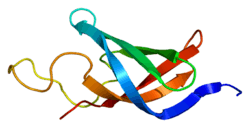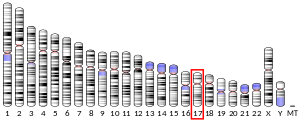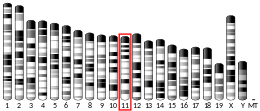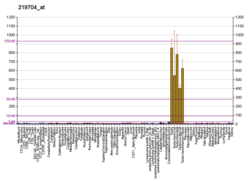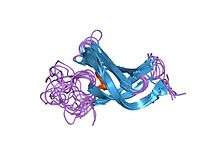YBX2
Y-box-binding protein 2 is a protein that in humans is encoded by the YBX2 gene.[5][6][7]
References
- ENSG00000288504 GRCh38: Ensembl release 89: ENSG00000006047, ENSG00000288504 - Ensembl, May 2017
- GRCm38: Ensembl release 89: ENSMUSG00000018554 - Ensembl, May 2017
- "Human PubMed Reference:". National Center for Biotechnology Information, U.S. National Library of Medicine.
- "Mouse PubMed Reference:". National Center for Biotechnology Information, U.S. National Library of Medicine.
- Tekur S, Pawlak A, Guellaen G, Hecht NB (Jul 1999). "Contrin, the human homologue of a germ-cell Y-box-binding protein: cloning, expression, and chromosomal localization". J Androl. 20 (1): 135–44. PMID 10100484.
- Gu W, Tekur S, Reinbold R, Eppig JJ, Choi YC, Zheng JZ, Murray MT, Hecht NB (Dec 1998). "Mammalian male and female germ cells express a germ cell-specific Y-Box protein, MSY2". Biol Reprod. 59 (5): 1266–74. doi:10.1095/biolreprod59.5.1266. PMID 9780336.
- "Entrez Gene: YBX2 Y box binding protein 2".
Further reading
- Hammoud S, Emery BR, Dunn D, et al. (2009). "Sequence alterations in the YBX2 gene are associated with male factor infertility". Fertil. Steril. 91 (4): 1090–5. doi:10.1016/j.fertnstert.2008.01.009. PMID 18339382.
- Yoshida T, Izumi H, Uchiumi T, et al. (2006). "Expression and cellular localization of dbpC/Contrin in germ cell tumor cell lines". Biochim. Biophys. Acta. 1759 (1–2): 80–8. doi:10.1016/j.bbaexp.2006.02.005. PMID 16624424.
- Kohno Y, Matsuki Y, Tanimoto A, et al. (2006). "Expression of Y-box-binding protein dbpC/contrin, a potentially new cancer/testis antigen". Br. J. Cancer. 94 (5): 710–6. doi:10.1038/sj.bjc.6602987. PMC 2361212. PMID 16479255.
- Kimura K, Wakamatsu A, Suzuki Y, et al. (2006). "Diversification of transcriptional modulation: large-scale identification and characterization of putative alternative promoters of human genes". Genome Res. 16 (1): 55–65. doi:10.1101/gr.4039406. PMC 1356129. PMID 16344560.
- Gerhard DS, Wagner L, Feingold EA, et al. (2004). "The status, quality, and expansion of the NIH full-length cDNA project: the Mammalian Gene Collection (MGC)". Genome Res. 14 (10B): 2121–7. doi:10.1101/gr.2596504. PMC 528928. PMID 15489334.
- Ota T, Suzuki Y, Nishikawa T, et al. (2004). "Complete sequencing and characterization of 21,243 full-length human cDNAs". Nat. Genet. 36 (1): 40–5. doi:10.1038/ng1285. PMID 14702039.
- Strausberg RL, Feingold EA, Grouse LH, et al. (2003). "Generation and initial analysis of more than 15,000 full-length human and mouse cDNA sequences". Proc. Natl. Acad. Sci. U.S.A. 99 (26): 16899–903. doi:10.1073/pnas.242603899. PMC 139241. PMID 12477932.
This article is issued from Wikipedia. The text is licensed under Creative Commons - Attribution - Sharealike. Additional terms may apply for the media files.
